Woke Politics Explained – From Theory to Power
“Woke” started as slang for staying alert to injustice. Today, it’s shorthand for a new political order. What began as campus theory morphed into HR policies, boardroom slogans, and government regulations. Woke politics isn’t just protest — it’s power, dressed as virtue.
Table of contents
What Is Woke Politics?
At its core, woke politics applies the language of oppression and liberation to every part of life. Rooted in Critical Theory and identity politics, it reframes society as a hierarchy of victims and oppressors.
- In universities: taught as “equity” and “social justice.”
- In corporations: sold as “ESG” and “DEI.”
- In politics: turned into laws on speech, hiring, and gender.
What began as an activist mindset is now a governing framework.
The Theory: From Academia to Activism
- Critical Theory: society as systems of power, not individuals.
- Intersectionality: oppression overlaps — race, gender, class.
- Postmodernism: truth is relative; language creates reality.
These ideas once lived in seminars. Now they shape HR training and public policy.
The Practice: From Slogans to Systems
- HR Departments: mandatory DEI sessions, bias audits, and language policing.
- Corporate Branding: rainbow logos, climate pledges, equity reports.
- Politics: quotas, speech laws, and climate regulations sold as justice.
- Media & Culture: online shaming, cancel campaigns, and virtue signalling.
Who Benefits? Who Doesn’t?
- Winners: Corporations and bureaucrats, who use woke politics as moral cover while consolidating power.
- Losers: Ordinary citizens and small businesses, who face new rules, costs, and less freedom to dissent.
The Consequences
Instead of liberation, woke politics delivers conformity. Instead of justice, it creates bureaucracy. It looks radical, but it props up the same elites it claims to fight. What began as a cry for change ends up as the perfect operating system for corporate and political control.
Conclusion
Woke politics didn’t stay on campus. It seized the levers of culture, business, and government. The result? A politics of slogans that sells justice while enforcing compliance. From theory to power — and from activism to control.
👉 For broader context, explore the full Woke Politics Explainer Series.
👉 Want the bigger picture on how power really works? Visit our Politics of Power Explainer Hub to see how leaders, corporations, and ideologies battle for control.
FAQ
What does “woke” mean in politics?
It means applying identity-based justice to laws, institutions, and culture.
Where did woke politics come from?
It grew from Critical Theory, postmodernism, and activism in universities.
Why do corporations use woke politics?
It’s a cheap way to look virtuous while protecting profit and power.
What’s the problem with it?
It turns fairness into bureaucracy and dissent into taboo.



